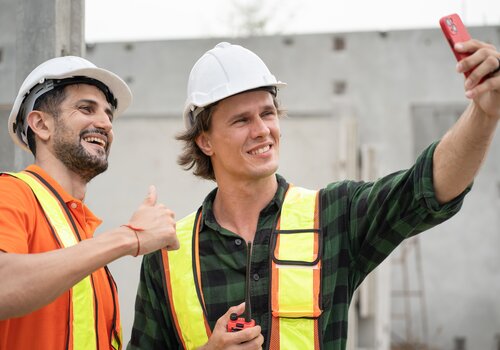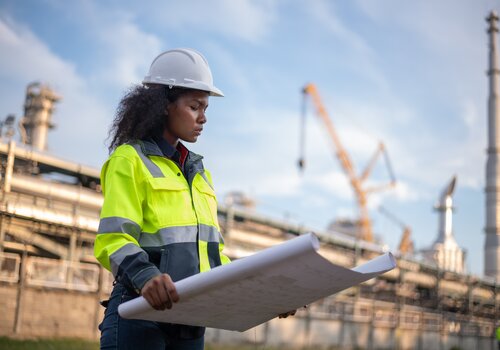If you are in a mental health crisis, call or text 988 to speak to a crisis counselor now. You can also text HOME to 741741 to reach the Crisis Text Line and speak to a live, trained crisis counselor. Learn more about the Suicide & Crisis Lifeline 988.
Josh Ierna is safety manager at Tilcon Connecticut Inc., where the company has implemented NIOSH’s Total Worker Health®. The program aims to protect workers by looking at work conditions broadly and including mental health to approach health and safety with preventative measures.
“I'll start by saying we're just scratching the surface,” Josh says. “We had a pretty long journey that ultimately landed us into the Total Worker Health® program from NIOSH and it's a thing that you just hop into. But you really develop it based on your own individual company needs using the fundamentals that they lay out.”
Industry professionals agree - customization for individual needs is key here.
Our research suggests that several types of work-related resources may help workers with current substance use disorder initiate recovery efforts and may help recovered workers sustain their recovery. These resources include creating structure in a person's life and providing a sense of accomplishment, economic security, social support, and access to appropriate health care.
L. Casey Chosewood, M.D.
Director, NIOSH Office of Total Worker Health
One of the barriers we have in the workplace is strict no drug policies. Many people don't realize still that there are ways around a drug test. So, the people who only do drug testing programs and policies aren't really addressing the underlying issue. What we advocate for is teaching everybody about the challenges and realities of addiction. We're trying to empower, educate and equip people to make informed decisions.
Cal Beyer
Senior Director, SAFE Workplaces
One of the things that we keep hearing is encouraging people to talk about [mental health], especially in the workplace… First, make sure that the unions, contractors and the people that work on site know that there is an employee assistance program that is confidential, that the employers can't see who's going. They may be able to track if people are using the service, but to ensure that there's confidentiality. And letting everybody on site on a regular basis know that this service is available.
Max Margolis
Program Director, Construction Suicide Prevention Partnership
PERSONALIZING MENTAL HEALTH IN CONSTRUCTION
A problem that arises from standardizing practices is it can start to feel like a checklist and the human element is lost. People start to operate on autopilot and serious consequences can happen when we aren’t acting mindfully.
The industry has set practices to prevent injuries like falls or risk of electrical shock, and programs like Total Worker Health® take similar preventative measures to address mental health concerns that arise in construction.
“That's the new challenge,” Josh says. “People end up in these situations because of high stress levels and different things at work that are happening due to the type of work, so why wouldn't we focus on these things that clearly lead up to the crisis rather than just trying to focus on when a person's basically at the brink of breaking?”
FLEXIBLE WORKING TO SUPPORT MENTAL HEALTH
“We’re not just looking at it like it's a standard from a book,” Josh says. “We talk about things like an EAP, but those are traditionally used when someone's in a time of crisis or need. So, that's where we see the necessity to challenge some of the industry norms, especially around work hours, individual employees, the nature of projects and how things work but without sacrificing the production side that we know the industry does need.”
The construction industry is known for being a high-stress environment. Production is king, so keeping things running on time and on budget is a high priority no matter what the project is. Because of this, people tend to work harder, and it becomes easy to overlook safety concerns when you’re “in the zone” trying to finish a task. From exerting yourself in extreme heat or working longer hours with not enough sleep, safety concerns creep up quickly – and these things affect our mental health, too. It’s a cycle; our work affects our wellness, and our wellness affects our work.
One of the norms being challenged is halting production for workers to get mental health care. Part of Tilcon Connecticut’s safety measures allows for a worker to stop if they need to talk to someone and Tilcon Connecticut pays for that peer to come in and counsel the worker.
“That was a change for us. We are absolutely challenging the traditional norms of allowing someone to disrupt their work. But it's at the benefit of everyone,” Josh says. “We want that employee to be okay, No. 1 as a person. But No. 2, if he's in poor mental health, he's not going to perform well. Any investment in our people is going to come back to us.”
Josh stresses the importance of helping people because they’re human beings and we should strive to take care of workers – but there is also a production benefit to making sure people are ok.
“There is a business case to this,” he says, “and sometimes I get caught up too much in it. But it's because I know it speaks the language that a lot of people that hold to those production values speak. So, that was a huge change for us that we've seen a big benefit from.”
GETTING STARTED
Like Josh says, Tilcon Connecticut kind of jumped into Total Worker Health®, which sounds scary from a business perspective. But the program takes leadership through all the steps, finding what works best for each individual company regardless of size. Everything in the program is backed by information that NIOSH has gathered, so these are science-based practices. They work and they work well. So, the best way to get started on supporting flexible working and worker well-being is really to jump in.
Tilcon Connecticut connected with Kyle Zimmer, the health & safety and members assistance program director at the International Union of Operating Engineers Local 478. Zimmer contacted NIOSH, which already had the data and statistics about the need for a more encompassing program to protect worker health. It made sense from a safety perspective to get involved, but the corporate leadership at Tilcon Connecticut recognized the crucial work being done and wanted to be part of it.
There’s a lot that goes into making flexible working options effective, from allowing production pauses to rotating schedules so workers have more personal time. For the team at Tilcon Connecticut, the effort is worth it.
“Look at it from the same way that we constantly preach traditional safety and health,” Josh says. “We want to be proactive. We don't want to be reactive only at the time when someone's in crisis.”
Content Notes: The CONEXPO-CON/AGG 365 newsletter will feature content about mental health over the course of the next few months. While these topics can be challenging, we want to remind you about one underlying feature: hope.
We will tackle topics related to suicide, PTSD and other mental health conditions that are prevalent in the construction industry. There are resources to help – whether you need help yourself or want to help a friend. Where there is help, there is hope.
One way to attack the mental health stigma is by telling your story. Please contact us if you would like to share your journey with fellow CONEXPO-CON/AGG 365 readers.
Another way to help is to share this story on your social media or with someone who may benefit from hearing about mental wellness in the construction industry.
Photo credit: PRESSMASTER/BIGSTOCKPHOTO.COM











